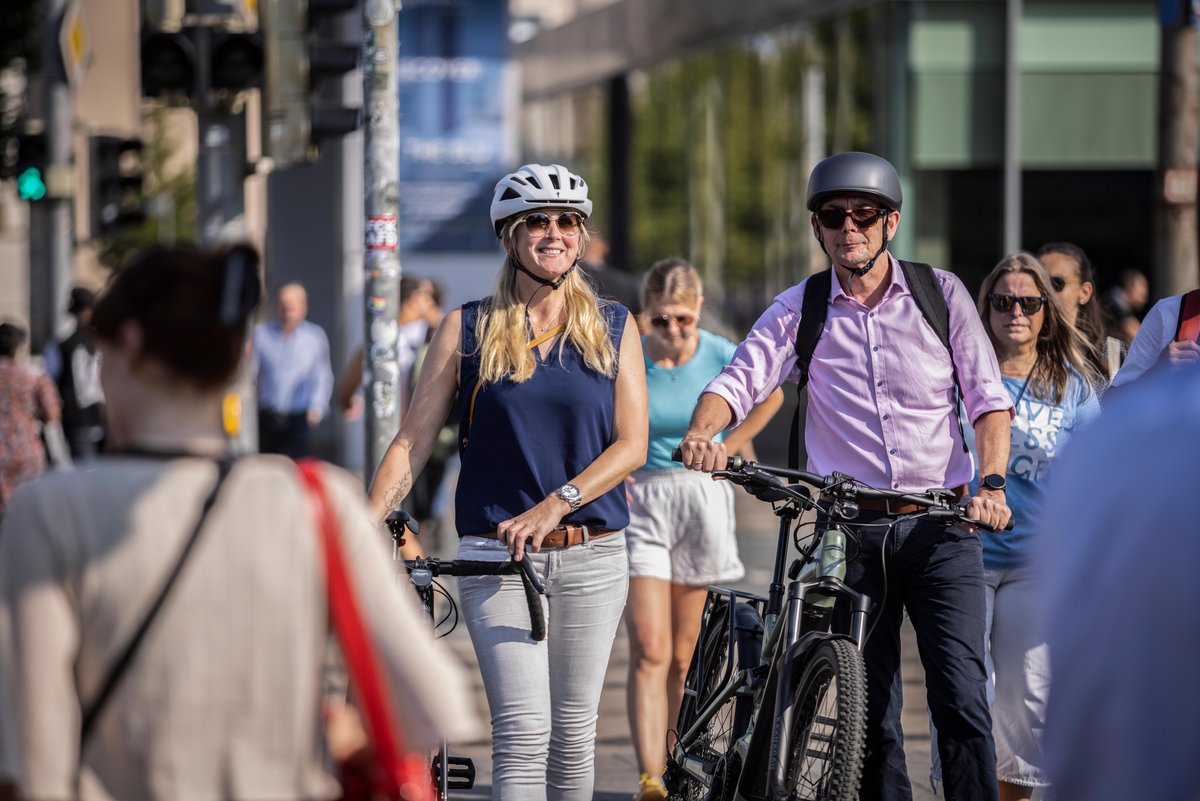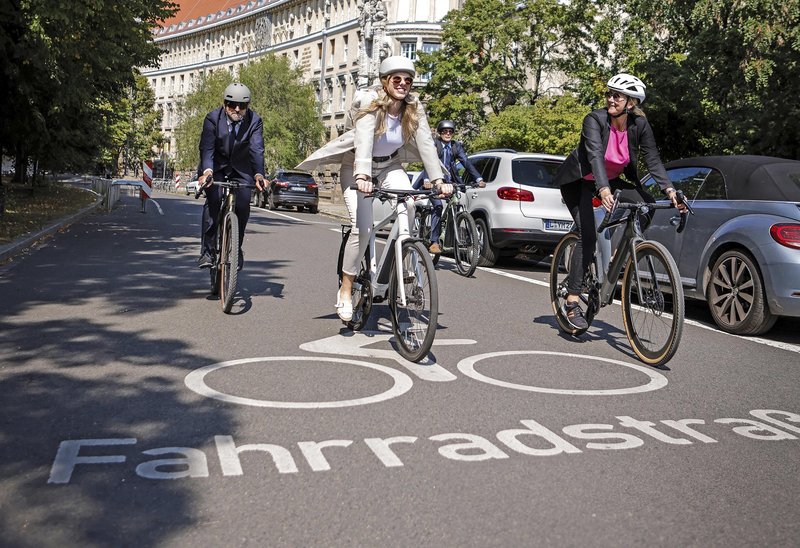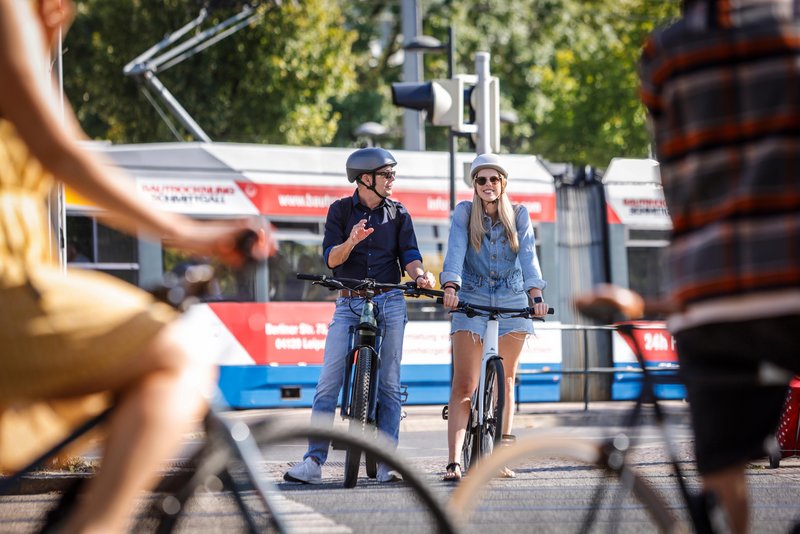

Company bike leasing – creating value for society
Company bike leasing & bicycle mobility
Contributing to climate and environmental protection
Economic significance of the company bike industry sector
Company bike leasing gets people onto the bike
Company bike leasing is popular because it helps employees and employers to save taxes and social security contribution through salary conversion. But what does the general public get out of it? After all, savings on the one side means less revenues on the other side. Let us explain what social aspects should be addressed in answering this question.
The basic idea behind company bike leasing is to get as many people as possible excited about cycling as a mode of transportation and, ideally, to motivate them to switch from cars to bikes on a larger scale. In order to assess the social impact of company bike leasing, the concept of bicycle-based mobility needs to be addressed in general terms, accounting for factors such as environmental protection, climate costs, and the economic significance of the bicycle market and the company bike industry sector.
Preventing detrimental environmental impact and climate costs
Road traffic causes major detrimental impact on the planet’s climate and the environment. The resulting health issues plus crop failures as well as damage to assets and ecosystems drive up the bill for society.
For example, particulate matter abraded from car tires accounts for around one third of all microplastic emissions. On average, each citizen in Germany produces approximately 1.2 kg of such particulate matter per year. Across the EU, this adds up to as much as 500,000 tons of tire abrasion annually. Transported by rainwater runoff, around 60 percent of this material ends up in our soil, while up to 20 percent ends up directly in surface water bodies. From there, such microscopic particles sometimes even find their way into the sea or, indirectly, into the human body.5,6,7
In 2021, the environmental costs of road transport and electricity and heat generation in Germany amounted to at least € 241 billion.8 In this context, any relevant assessment of bicycle mobility needs to compare the costs and benefits of bicycle mobility vs. those of car traffic.
A study conducted by Stefan Gössling in 2018 indicates that cycling generates around 30 cents per person kilometer for society, while driving a car incurs costs of around 20 cents per person kilometer (see table). This comparison takes into account average values and various factors such as taxes and duties. The figures illustrate that cycling is less of a cost factor and more of a contribution to reducing the burden on the state.
| Parameter | Bicycle, €/pkm | Car, €/pkm | ||
|---|---|---|---|---|
| Social costs | Private costs | Social costs | Private costs |
Climate change | <0,001 | 0 | 0,004 | 0 |
Subsidies | <0,001 | 0 | 0,003 | 0 |
Air pollution | <0,001 | 0 | 0,055 | 0 |
Noise | <0,001 | 0 | 0,076 | 0 |
Infrastructure (development) | 0,004 | 0 | 0,086 | 0 |
Existing infrastructure | <0,001 | 0 | 0,002 | 0 |
Parking | <0,001 | <0,001 | 0,027 | 0,027 |
Ecosystem services | ? | 0 | ? | 0 |
Soil and water quality | <0,001 | 0 | 0,006 | 0 |
Resource consumption, waste | <0,001 | 0 | 0,007 | 0 |
Operating costs | 0 | 0,052 | 0 | 0,267 |
Travel time | 0 | 0,291 | 0 | 0,093 |
Traffic jams, slow-moving traffic | 0 | 0,002 | 0 | 0,021 |
Health effects | -0,321 | -0,223 | 0 | 0 |
Increased life expectancy | 0,011 | -0,534 | 0 | 0 |
Accidents | 0,001 | ? | 0,003 | ? |
Perceived safety, discomfort | 0 | 0,110 | 0 | ? |
Quality of life, image, tourism | ? | ? | ? | ? |
Total | -0,305 | -0,302 | 0,269 | 0,408 |
Source of table: Gössling, 2018
Economic significance of the bicycle market and the company bike industry sector
The role of the bicycle in terms of social justice and efficiency
A deeper look: company bike leasing vs. company car leasing
The so-called company car privilege applies to the leasing of both company cars and company bicycles. However, this has only been the case since a tax decree was issued by the federal states in 2012. Prior to this decree, the regulation only provided tax incentives for the use of company cars.
Key facts: the company car privilegeAccording to recent studies, company car leasing in Germany is subsidized by an estimated 3.1 to 5.25 billion euros annually.22 |
Company car vs. company bike
Both company cars and company bikes may be financed by salary conversion from the employee’s gross salary or as perks by the employer. While company cars are primarily about the use of the vehicle, in many cases it is attractive for employees to take over the bike at the end of the lease term. There are similarities – as well as some differences – in terms of taxation, social security contributions and associated pension entitlements. What matters is not only whether it’s a car or a bike but rather if the salary conversion option is used or whether the employer provides a leased vehicle as a perk.
Keyword: salary conversion
Regardless of whether it is a company car or a company bicycle: Salary conversion results in a reduction in gross salary, thus lowering income tax and social security contributions. Consequently, this has an impact on future pension entitlements. The difference between a company bicycle and a company car is primarily in the extent of the financial impact: Since the monthly lease payments for company cars are higher than for company bicycles (because cars cost significantly more than bicycles), salary conversion has a much greater impact on social security contributions and thus on future entitlements.
Keyword: taxation
In Germany, the private use of a company car is generally taxed as a monetary benefit. For combustion engine vehicles, the so-called 1% rule applies. Electric vehicles and company bikes, on the other hand, benefit from the more favorable 0.25% rule. Another difference is the taxation of commuting as a monetary benefit: Again, electric vehicles fare better (and more cheaply) than combustion engines, while company bicycles are not taxed at all for the commute. Sound complicated? For more information on company bicycles and taxes in our Company Bike Taxation Guide.
Keyword: company car and company bike as a perk
In addition to financing company vehicles through salary conversion, employers also have the option of providing their employees with company vehicles as a perk, i.e., in addition to the agreed salary. This approach clearly differentiates between company cars and company bikes: For company bikes provided as a perk, the gross salary remains the same and the monetary benefit is completely tax-free (with the exception of S-pedelecs). Company cars provided as a perk, on the other hand, affect the gross salary, implying that taxes and social security contributions increase as well. For further information on this topic, visit: Company bikes as a perk.
Keyword: being an attractive employer
Whether it’s a company car or a company bike: Employee benefits are a useful tool for making a company more attractive as an employer. However, company bike leasing is not only a good way to motivate employees and increase their loyalty to the company – it also promotes sustainable and healthy mobility among the workforce. At the same time, companies benefit as well. That’s because physically active employees tend to be more resilient and take fewer sick days, which, according to the National Cycling Plan, could reduce production impairment and outages across Germany by up to € 2.1 billion annually.25 In addition, employees who cycle to work tend to be more motivated and more productive, which will likely have a positive effect on the workplace atmosphere and the efficiency of the company.








